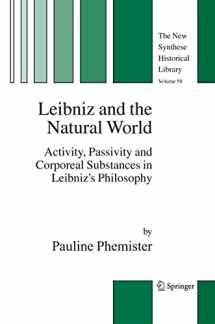
Leibniz and the Natural World: Activity, Passivity and Corporeal Substances in Leibniz's Philosophy (The New Synthese Historical Library, 58)
ISBN-13:
9781402034008
ISBN-10:
1402034008
Edition:
2005
Author:
Pauline Phemister
Publication date:
2005
Publisher:
Springer
Format:
Hardcover
314 pages
Category:
Ethics & Morality
,
Philosophy
,
History & Surveys
,
Modern
,
Movements
,
Reference
FREE US shipping
Book details
ISBN-13:
9781402034008
ISBN-10:
1402034008
Edition:
2005
Author:
Pauline Phemister
Publication date:
2005
Publisher:
Springer
Format:
Hardcover
314 pages
Category:
Ethics & Morality
,
Philosophy
,
History & Surveys
,
Modern
,
Movements
,
Reference
Summary
Leibniz and the Natural World: Activity, Passivity and Corporeal Substances in Leibniz's Philosophy (The New Synthese Historical Library, 58) (ISBN-13: 9781402034008 and ISBN-10: 1402034008), written by authors
Pauline Phemister, was published by Springer in 2005.
With an overall rating of 4.5 stars, it's a notable title among other
Ethics & Morality
(Philosophy, History & Surveys, Modern, Movements, Reference) books. You can easily purchase or rent Leibniz and the Natural World: Activity, Passivity and Corporeal Substances in Leibniz's Philosophy (The New Synthese Historical Library, 58) (Hardcover) from BooksRun,
along with many other new and used
Ethics & Morality
books
and textbooks.
And, if you're looking to sell your copy, our current buyback offer is $0.3.
Description
In the present book, Pauline Phemister argues against traditional Anglo-American interpretations of Leibniz as an idealist who conceives ultimate reality as a plurality of mind-like immaterial beings and for whom physical bodies are ultimately unreal and our perceptions of them illusory. Re-reading the texts without the prior assumption of idealism allows the more material aspects of Leibniz's metaphysics to emerge. Leibniz is found to advance a synthesis of idealism and materialism. His ontology posits indivisible, living, animal-like corporeal substances as the real metaphysical constituents of the universe; his epistemology combines sense-experience and reason; and his ethics fuses confused perceptions and insensible appetites with distinct perceptions and rational choice. In the light of his sustained commitment to the reality of bodies, Phemister re-examines his dynamics, the doctrine of pre-established harmony and his views on freedom. The image of Leibniz as a rationalist philosopher who values activity and reason over passivity and sense-experience is replaced by the one of a philosopher who recognises that, in the created world, there can only be activity if there is also passivity; minds, souls and forms if there is also matter; good if there is evil; perfection if there is imperfection.


We would LOVE it if you could help us and other readers by reviewing the book
Book review

Congratulations! We have received your book review.
{user}
{createdAt}
by {truncated_author}


